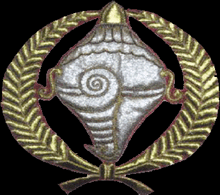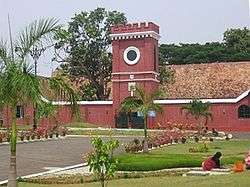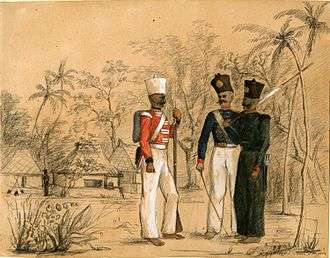Nair Brigade
The Nair Brigade was the army of the erstwhile kingdom of Travancore in India. Nairs were a community of the region. The personal bodyguard of the king Marthanda Varma (1706–1758) was called Thiruvithamkoor Nair Pattalam (Travancore Nair Army). The Travancore army was officially referred as the Travancore Nair Brigade in 1818.
| Travancore Nair Brigade | |
|---|---|
 Flag of Nair brigade | |
| Disbanded | 1949 |
| Service branches |
|
| Headquarters | Thiruvananthapuram |

In the early years, only Nairs were admitted into this brigade. Later, the unit was expanded and several sub-units were formed. The name Nair Brigade remained unchanged, even following the admittance of non-Nairs. The headquarters of the brigade was in Thiruvananthapuram (Trivandrum).
History

The army of Travancore was modernised by Marthanda Varma, who is known as "the maker of modern Travancore".The first Commander in Chief of his army was Kumaraswamy Pillai,[1] who was a veteran soldier. Thanu Pillai, brother of then Dalawa Arumukham Pillai was made the Lieutenant Commander. He defeated the Dutch army with the Nair Brigade in 1741 at the Battle of Colachel and captured the Dutch commander Captain Eustachius De Lannoy.[2] Marthanda Varma agreed to spare the Dutch captain's life on condition that he joined his army and trained his soldiers on modern lines.[3]
The Travancore army was reorganised as the Travancore Nair Brigade in 1818.[4] The Travancore Army was considered a part of the Indian State Forces from 1935. The units were known as the First, Second and Third Travancore infantry. The State Forces consisted of infantry units, the State Forces Artillery, the Travancore Training Centre, the Sudarsan Guards and the State Forces Band.[5] With the integration of the State into the Indian Union, the Nair Brigade was integrated into the Indian Army as the 9th Battalion Madras Regiment (1st Travancore) and the 16th Battalion of the Madras Regiment (2nd Travancore) in 1954.[6]
Strength
The Nair Army of Travancore was very strong during the 1700s and 1800s. Later, with the strengthening of English East India Company, and with Travancore signing a treaty handing over defence to the Company's army, the Nair Brigade headcount was reduced.
The total strength of Travancore Nair Army in 1945 was 4,082 men, of which 84 were officers and 132 were JCOs. A part of this force (those within medical categorization 'A') were absorbed into the Indian Army (Travancore - Cochin unified forces), while the remaining forces were disbanded. After the unification of Travancore and Cochin forces, Trivandrum was declared as the headquarters of the unified command. Major General V.N. Parameswaran Pillai, the GOC of the Travancore Nair army, became the commandant of the unified forces. The unified force was divided into five infantry battalions (Travancore - I, II, III and IV, Cochin I). The unification took place under Major General V.N. Parameswaran Pillai of Travancore and Lt Col G.S. Subbiah of Cochin on 20 May 1949. Finally the forces unified Travancore-Cochin forces were either disbanded or absorbed into the Indian Army and Major General V.N. Parameswaran Pillai was allowed to retire.[7]
The first group of State Forces of Cochin Kingdom was also called as the Nair Brigade in 1940. The Brigade's name was changed in 1945 to Cochin State Forces by Kerala Varma and allowed non-Nairs also to be admitted into his army. Following the integration of Travancore Army with the Indian Forces, the Pazhavangadi Ganapathi Temple in Thiruvananthapuram which the Brigade maintained and owned was likewise transferred to the Indian Army.
See also
- History of Thiruvananthapuram
- Battle of Colachel
- 9th Battalion Madras Regiment
- Pazhavangadi Ganapathy Temple
Notes
- Travancore State Manual pdf Digital book
- "9 Madras : A Tale of 'Terrors'". Sainik Samachar. The journal of India's Armed Forces. Archived from the original on 12 March 2016. Retrieved 20 April 2007.
- "Battle of Colachal". Sainik Samachar. The journal of India's Armed Forces. Archived from the original on 12 March 2016. Retrieved 20 April 2007.
- "Army of Travancore". Report of the Administrative Reforms Committee 1958. Government of Kerala. Archived from the original on 16 December 2006. Retrieved 19 February 2007.
- "Army Units of Travancore". Report of the Administrative Reforms Committee 1958. Government of Kerala. Archived from the original on 16 December 2006. Retrieved 19 February 2007.
- "Army of Travancore". Military Heritage. Government of India. Archived from the original on 26 June 2017. Retrieved 27 March 2020.
- S. N. Sadasivan (2005). Political and administrative integration of princely states. Mittal Publications. pp. 76–. ISBN 978-81-7099-968-3. Retrieved 7 June 2011.